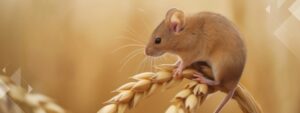 Mice, often viewed solely as uninvited guests in our homes, play a pivotal role in maintaining the delicate balance of our ecosystem. What mice eat, primarily consisting of seeds and insects, contributes to seed dispersal and control insect populations, thereby supporting biodiversity. Through their foraging, these rodents also aerate the soil, facilitating plant growth and enriching the Earth's fertility.
What many don't realize is that spots where rodents' nests are commonly found coincide with areas that offer food accessibility and shelter, traits quintessential for their survival. While it's important to acknowledge the beneficial aspects of their presence in nature, it’s equally crucial to understand what pest control for mice accomplishes.
Professional pest control from Truly Nolen serves as a necessary measure to maintain the fine line between ecological harmony and the potential health risks posed when mice overstep into human habitats. It's a delicate balancing act between safeguarding our homes and respecting the environmental roles these small yet significant creatures fulfill.
Mice, often viewed solely as uninvited guests in our homes, play a pivotal role in maintaining the delicate balance of our ecosystem. What mice eat, primarily consisting of seeds and insects, contributes to seed dispersal and control insect populations, thereby supporting biodiversity. Through their foraging, these rodents also aerate the soil, facilitating plant growth and enriching the Earth's fertility.
What many don't realize is that spots where rodents' nests are commonly found coincide with areas that offer food accessibility and shelter, traits quintessential for their survival. While it's important to acknowledge the beneficial aspects of their presence in nature, it’s equally crucial to understand what pest control for mice accomplishes.
Professional pest control from Truly Nolen serves as a necessary measure to maintain the fine line between ecological harmony and the potential health risks posed when mice overstep into human habitats. It's a delicate balancing act between safeguarding our homes and respecting the environmental roles these small yet significant creatures fulfill.
What is the Role of Mice in the Ecosystem?
Mice play a crucial role in maintaining ecosystem balance through their interactions with various elements of their environment. As seed consumers, mice contribute to seed dispersal, aiding in plant propagation and diversity within ecosystems. By feeding on seeds and fruits and then scattering them as they move, mice help plants colonize new areas, enhancing biodiversity and supporting the overall health of the ecosystem. Furthermore, mice serve as prey for numerous predators, including birds of prey, snakes, and small carnivores. Their presence in the food chain helps sustain higher trophic levels and promotes species diversity. Mice also act as scavengers, consuming decaying organic matter and playing a vital role in nutrient cycling within ecosystems. Despite their small size, mice can have a significant impact on their surroundings. Their foraging activities aerate the soil, promoting nutrient circulation and microbial activity. Additionally, their burrowing behaviour can influence soil structure and water infiltration rates, potentially benefiting plant growth and overall ecosystem health. The presence of mice in ecosystems is essential for maintaining ecological balance, promoting biodiversity, and supporting the interconnected web of life. Understanding and appreciating the role of mice in ecosystems is paramount to preserving the health and sustainability of natural habitats.The Hidden Dangers of Mice Presence in the Home
Though their ecological importance is undeniable, the presence of mice in your home can pose serious health risks. Mice are known vectors of numerous diseases, such as hantavirus, tularaemia, and Salmonellosis. Furthermore, their nesting and feeding habits can cause structural damage to properties, chew through wiring, and contaminate food stores. It is paramount for homeowners to comprehend the magnitude of these possible threats, whether a single mouse is spotted scurrying across the kitchen floor or a full-blown infestation is at hand. When mice take up residence, they don't do so discretely. Nests are crafted with clever use of shredded material often found within the confines of your walls or stored items. Their ability to gnaw through almost any material—wood, insulation, electric wires—means that their presence in your home is a potential hazard both in the short and long term, compromising the safety and habitability of your dwelling. Mice are by no means the most sanitary houseguests. Their constant need to gnaw is not just limited to inanimate objects; they are liable to chew on food and whatever they deem edible. This is a matter not only of food disposal but of cross-contamination; when mice intrude, the integrity of your stored groceries is in peril. Their droppings and urine are carriers of serious illnesses, which is particularly dangerous in homes with children or pets. Mice's propensity to chew through wiring material is a known fire hazard. What starts as seemingly innocuous nibbling can rapidly escalate into an electrical issue, which, when coupled with their paper-shredding habits, creates a combustible environment. This connection between mice presence and house fires underscores the urgent need for professional pest control as a matter of safety.

